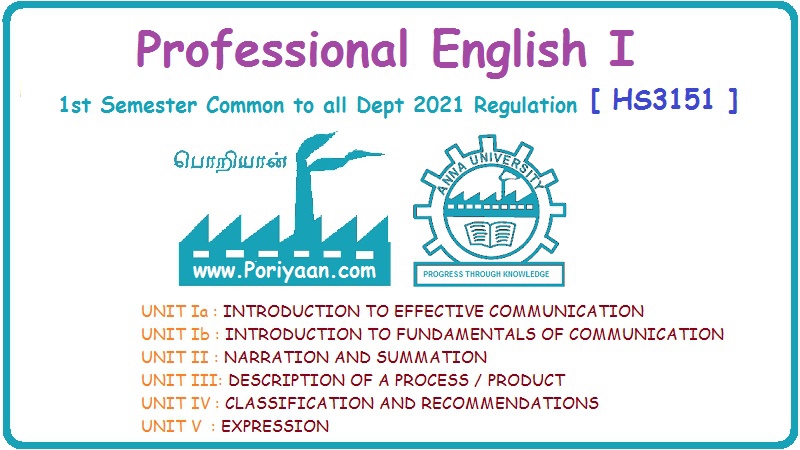Professional English I: Skill 1: Introduction to Effective Communication: Grammar
Questions Types
Grammar
A question is a request for information or action. There are two types of questions - open and closed.
Topic 2 QUESTIONS TYPES INTRODUCTION A question is a request for information or action. There are two types of questions - open and closed. Closed questions demand a yes / no, true / false or right / wrong answer. Open questions leave room for a description or opinion, and are more useful in eliciting information. Open questions are often called Wh- questions : when, where, which, who, whom, whose, why and how is added to this list as they are all used to elicit particular kinds of information. Examples Sentences : Questions S AV MV : AV S We have bought a few computers : Have you bought a few computers? The software was already tested : Was the software already tested? I live in London : Where do you live? I bought the computer from Korea : Where did you buy the computer? Question forms can be classified into six categories. 1. Yes or No questions 2. Wh- questions 3. Subject / Object questions 4. Wh - questions with prepositions 5. Negative questions 6. Tag questions 1. a. Yes or No Questions These questions are meant for eliciting information. They begin with auxiliary verbs with the form ‘be' or 'have' or a model verb e.g. may, can, will Yes or No questions have other functions. The following are some examples of their different uses. 1. b. Short Answers It is rather impolite to answer this type of questions with a simple 'yes' or 'no? We often use a short answer. A positive short answer is in the form of yes+ a pronoun + an auxiliary. The negative short answer is no + a pronoun + an auxiliary + n't. 2. Wh- Questions Wh- questions begin with question words like which, what, who, where, when, why, how and whose. They are in the form. Question word + an auxiliary verb + subject. The auxiliary verb is 'be' or 'have' or a ‘modal verb? 3. Subject or Object Questions The word order is the same as wh-questions. 4. Wh- Questions with Preposition The preposition normally follows the verb. In formal English the preposition occurs before the question word. Who are you booking for? How was the party like? What are you worrying about? In which place is the computer available? From whom did you get this instrument? 5. Negative Questions We form negative questions by adding ‘n't after the auxiliary. A negative question conveys an affirmative meaning. 6. Question Tags A question tag is a short question tagged on to a statement to make it an apparent question. It is meant to ask the reader or listener to confirm the statement. Its form comprises an auxiliary verb or a form be or do followed by a personal pronoun which corresponds to the subject. A positive statement should have a negative tag and a negative statement, a positive tag. Examples In simple present tense we use do / does and past tense did Mr. Shastri teaches electronics, doesn't he? You don't do what I tell you, do you? John turned out for the meeting, didn't he? The negative tag for “I am' is ‘aren't I' and the positive tag is ‘am I I am a fool to believe him, aren't I? I am not a member, am I? “They’ is used as corresponding pronoun in question tag for someone, somebody, nobody, no one. No body likes her, do they? Poor lady, nobody helped her, did they? Adverbials rarely, scarcely, hardly etc are treated as negative words and hence they require positive tags. We rarely meet these days, do we? He hardly finds time to read even newspapers, does he? Practice
Exercises 1. Write wh-questions for the following statements. 1. My mother helped me with my homework yesterday. 2. We are going to Japan next month. 3. Ann bought a new car last week. 4. I haven't seen Jack for ages. 5. My brother can sing very well. 6. She went to England last summer. 7. The police finally came. 8. I am going to talk to her in the morning. 9. Jim bought the old guitar because he liked to play. 10. Her mother brought her some tea because she was ill. 11. Elizabeth saw a fox in the snow. 12. The accident happened at 11o'clock on Friday. 13. There was a shop near her house. 14. The boy came here to buy some fish. 15. Jake and his wife live in New Zealand. 16. He can't buy his children new clothes. 17. The postcard came from Spain. 18. There are two dogs in the garden. 19. The cats belong to me. 20. There are lots of posters and pictures on the wall. 21. The teacher is not very friendly. 22. He waters his plants once a week. 23. The pupil speaks Russian. 24. The party is on Tuesday. 25. The bridge will be finished next year. 26. I have never been to South Africa. 27. Mrs. Kelly goes to church every Sunday. 28. The exam was extremely difficult. 29. My friends are returning from Italy tomorrow. 30. The Danube River flows into the Black Sea. 31. Tom's away at the moment. 32. There was an interesting programme on the radio this morning. 33. In Britain, children start school at the age of 5. 34. Jeremy usually goes to school by car. 35. Jack's house is not big enough for two families. 36. Jill will start her new job next week. 37. I am meeting Ann at five o'clock tomorrow. 38. Ken gave up smoking two years ago. 39. There might be a meeting on Friday. 40. We go to the cinema once a week. II. Ask questions with each of the question words. 1. We went home quickly in the evening. (how, where, when) 2. Peter watched his friend closely. (whom, how) 3. Jenny told us a long story yesterday. (who, what, when) 4. All the pupils behave well in class. (who, where) 5. Grandmother will call us early in the morning. (who, when) 6. All of us have to wear a uniform in school. (where, what) 7. The Aborigines have been living in the outback of Australia for thousands of years. (how long, where, who) 8. It rained heavily every day. (how) 9. I went to my friend's place yesterday because I didn't have anything else to do. (where, when, why) 10. He spent the evening playing cards. (what) 11. We are travelling to Scotland in the morning. (where, when) 12. This is John's book, so don't lose it. (whose) 13. Sarah had to leave earlier because her mother was waiting for her outside. (why, who) 14. We go to the Italian restaurant about once a week. (how often, where) 15. Jane went home quickly after the concert. (who, when) III. Complete each sentence with an appropriate question word. 1. ________ did you do that for? 2. ________ dress do you want to wear, the red one or the blue one? 3. ________ opened the door? 4. ________ keys are these? - I think they're dad's 5. ________ does this CD player work? 6. ________ is bothering you? 7. ________ is the car? 8. ________ money do you have in your bank account? 9. ________ are the sisters going to leave? 10. ________ is your favorite actress? 11. ________ did the party last? - Almost two hours. 12. ________ did you do in Australia? 13. ________ jacket is this? I think it's mine. 14. ________ do they normally do their homework? 15. ________ don't you get up earlier? It's so sunny outside. 16. ________ do you do on weekends? 17. ________ is your favorite singer? 18. ________ was the flight?-Oh, it was great. 19. ________ are you from? 20. ________ textbook did you use last summer? 21. ________ do you normally get to school? 22. ________ did you find her?—Yesterday evening. She was in the park. 23. ________ does she teach? 24. ________ have you been all the time?--At the playground. 25. ________ can John ask if he wants to go to the University? 26. ________ was the play?-It was great. 27. ________ do you want to eat? Pasta and Cheese. 28. ________ did you leave your keys? 29. ________ one do you prefer? - The red one. 30. ________ do you go to the gym? IV. Rewrite the following sentences as 'yes/no' questions. 1. She is a healthy woman. 2. They are responsible 3. She is working in the kitchen. 4. They will arrive tomorrow. 5. They have been working here for over ten years. 6. She has phoned him twice this week. 7. The children are playing in the garden. 8. He gets up at five o'clock every morning. 9. She watches TV every evening. 10. He goes to the office at 9 o'clock every day. 11. He cooks his own breakfast. 12. The boys cleaned the blackboard. 13. They are interested in cricket. 14. Sunil has sent the report. 15. He can climb trees easily. 16. Maria has gone to bed. 17. His father works in the garden every evening. 18. He passed the driving test yesterday. 19. The boy has returned the books. 20. The girls swept the floor. V. Form two questions. First form the 'ordinary question' and then form the 'negative question'. Example He is writing a letter. Is he writing a letter? Isn't he writing a letter? 1. She's reading a book. 2. He was ready to help you. 3. She'll give us all the news. 4. They would like to meet you. 5. He has been working hard. 6. We are leaving tomorrow. 7. She's teaching the boy. 8. Your father is working in the garden. 9. The boys are playing cricket. 10. We can solve the problem. 11. She has replied to all the letters. 12. The guests came by car. 13. The girl went to the post office. 14. You forgot the number. 15. She enjoyed the programme. 16. He works in a bank. 17. He always comes late. 18. The boy will bring the dictionary. 19. He has won the election. 20. Your parents will be happy. VI. Add appropriate question tags. Example She's very clever, __________? She's very clever, isn't she? 1. You have written the letter, __________? 2. He can swim, __________? 3. She will come tomorrow, __________? 4. They are doing their homework, __________? 5. The boys were playing in the garden, __________? 6. The guests left early, __________? 7. You returned the book, __________? 8. They will be here tomorrow, ___________? 9. Tom doesn't smoke, __________? 10. He should meet the principal, __________? 11. She's typing a letter, __________? 12. The programme has started, __________? 13. You wouldn't do such a thing, __________? 14. A change would be nice, __________? 15. He couldn't go there, __________? 16. You ought to visit her, __________? 17. They must come early, __________? 18. Suja will be there, __________? 19. Jose won't accept the offer, __________? 20. Her father is busy, __________? 21. This is a useful book, __________? 22. That is not the solution, __________? 23. Some money has been wasted, __________? 24. I am trying to help him __________? 25. Everything was in order, __________? 26. Nothing happened, __________? 27. There is nothing to be done, __________? 28. She seldom writes to me, __________? 29. They hardly go to the cinema, __________? 30. Nobody was watching me, __________? 31. Few students came, __________? 32. A few people came, __________? 33. Little has been done, __________? 34. A little progress has been made, __________? 35. Everybody enjoyed the programme, __________? 36. Somebody telephoned, __________? 37. Anyone can do it, __________? 38. None of the food was wasted, __________? 39. Stop talking, __________? 40. Open the window, __________? VII. Identify the following questions as yes/no, information, alternative or indirect questions. 1. Is your brother attending the function? a. yes / no question b. information question c. alternative question d. indirect question 2. When is your test? a. yes/ no question b. information question c. alternative question d. indirect question 3. The teacher asked the boy whether he had finished his work. a. yes / no question b. information question c. alternative question d. indirect question 4. Are you an atheist or an agnostic? a. yes / no question b. information question c. alternative question d. indirect question 5. Does your brother live in Chennai? a. yes / no question b. information question c. alternative question d. indirect question 6. Can you tell me where the post office is? a. yes / no question b. information question c. alternative question d. indirect question 7. Do you want to study here or join another college? a. yes / no question b. information question c. alternative question d. indirect question 8. When do you get up in the morning? a. yes / no question b. information question c. alternative question d. indirect question 9. He asked her whether she would phone him. a. yes / no question b. information question c. alternative question d. indirect question 10. Where does she come from? a. yes / no question b. information question c. alternative question d. indirect question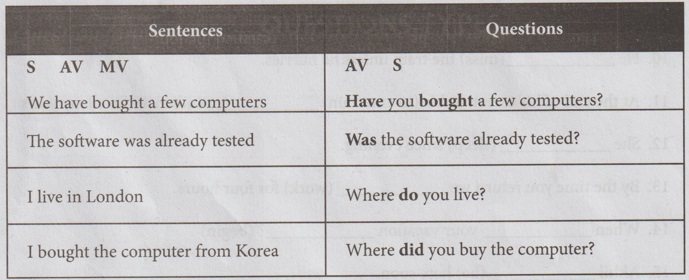
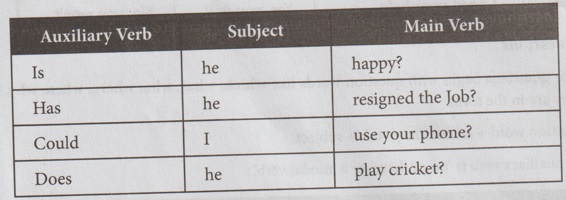
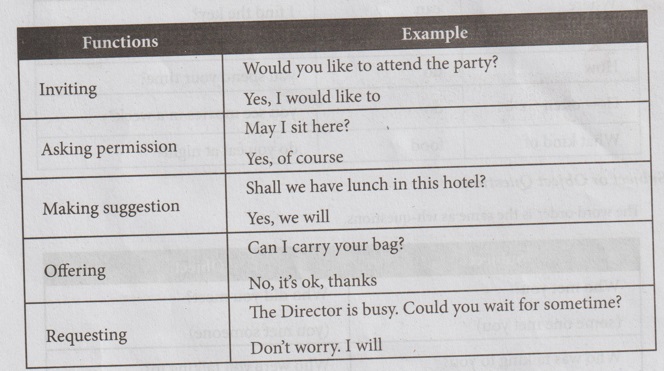
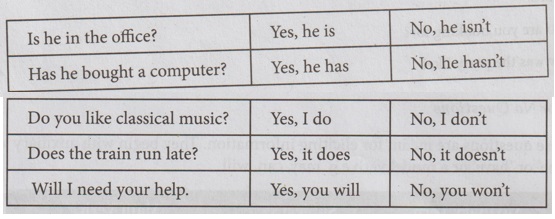




Professional English I: Skill 1: Introduction to Effective Communication: Grammar : Tag: : Grammar - Questions Types
Related Topics
Related Subjects
Professional English I
HS3151 1st semester | 2021 Regulation | 1st Semester Common to all Dept 2021 Regulation
